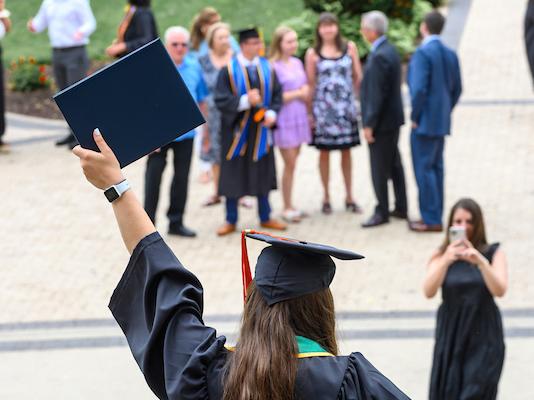When the Education, Schooling, Society program at Notre Dame became a supplementary major last year, Andrea Christensen expected that she would congratulate its first graduates after a couple of years.
Instead, three Notre Dame seniors – Julia French, Kate Morse, and Claire Murphy – enjoyed ESS so much, and had taken so many ESS courses, that they’ll graduate from the University this weekend with a supplementary major in the program.
Soon after, French and Morse will join the 29th cohort of ACE Teaching Fellows, and Murphy will teach in Spain through the Meddeas program.
“I had always been told by ESS students that they would love for all of their classes to be ESS classes,” said Christensen, the program’s director of undergraduate studies. “Our ESS students have always taken more credits than what is required because they just loved the courses so much.”
ESS had previously been a 15-credit minor exploring the questions of how humans learn and how society, politics and the economy influence that learning. Since its start in 2002, ESS has grown into one of the largest minors in the College of Arts and Letters, with about 115 students taking it each year.
As a supplementary major, ESS consists of eight courses and includes an educationally-focused research methods class, a community-based learning course requirement, and an additional elective in addition to the minor's five-course sequence. Students were able to enroll in the supplementary major beginning this academic year.
Because French, Morse, and Murphy had taken enough ESS courses, they were able to graduate this year with the supplementary major.
Now that students can pursue ESS as a supplementary major, it has opened up new opportunities for learning, said Mike Macaluso, an ESS professor.
“It’s allowing students an opportunity for depth and contemplation,” he said. “It’s giving them a way to think deeply about how their own interests and passion for educational issues can be furthered, deepened or even changed as a result of the combination between ESS and their primary major.”
Murphy said that she was drawn to the program by the varied experiences of other students.
“ESS has a lot of diverse perspectives in it,” said Murphy, a psychology major with an additional supplementary major in Spanish. “There are students from different disciplines and all different majors. That really surprised me, but it was also really eye-opening. It was great to hear the perspectives of people who studied completely different things than I did.”
Murphy will teach English to 5- to 18-year-olds in Spain next year. What she has learned in her ESS courses shaped how she sees her upcoming teaching experience.
“Education Psychology with Professor Christensen opened my eyes to the role of the teacher in the classroom,” Murphy said. “I had a misconception that teaching should be instructor-centered and didactic, but I’ve learned about the importance of taking a student-centered approach and making sure that students are active participants in their own learning.”
Morse, who will teach math at Providence Cristo Rey High School in Indianapolis as part of ACE 29, had her own misconceptions about education debunked by ESS courses.
“Before I started taking ESS classes, I thought that if I wanted to do the minor then I would have to want to be a teacher,” she said. “Now that I’ve taken many ESS classes, I don’t think it’s the case. When you come to college, you realize how different everyone’s educational upbringing is and how complex the various experiences are in the American education system. Learning more about your education experience is beneficial for anyone.”
She said that once she graduates from ACE Teaching Fellows, she’s interested in education research and technology, a field she learned about through one of her ESS courses.
“I took the ‘Where Can ESS Take You?’ course, and one of our speakers graduated with an ESS minor and now works at an education technology company,” said Morse, who will also graduate with a major in applied and computational mathematics and statistics and a minor in digital marketing. “Since I learned about it, I’ve been able to get involved in two labs that were focused on education technology.”
Murphy and Morse’s experiences resonate with what ESS professors have heard many of their students express, Macaluso said. “More and more, we’re hearing our students say that they’re thinking differently about their discipline as a result of ESS.”
If you ask an ESS student or professor to tell you what they love most about the program, they will tell you about the people involved in ESS and the passion they exude for what they’re teaching and learning.
“You can’t go wrong with any class you take because all of the professors are so phenomenal,” said French, a philosophy major with a minor in theology. “Any class you take, you’re going to come away with such an enjoyable experience. The bonus is that you learn, too.”
This fall, French will teach middle school English and religion at Our Lady of the Rosary Catholic School in Los Angeles, and the passion her ESS professors have demonstrated has shaped the kind of teacher she aspires to be. “I’ve learned that there’s no shame in showing students how passionate you are about something,” Julia says. “It’s so beautiful and powerful to see people come alive when they’re talking about what they love.”
“All ESS students are passionate about education in some way, shape, or form,” Christensen said. “The supplemental majors tend to have decided that education is something they want to pursue seriously, whether through teaching, policy work, social work, or other grad programs.”
 Alliance for Catholic Education
Alliance for Catholic Education
